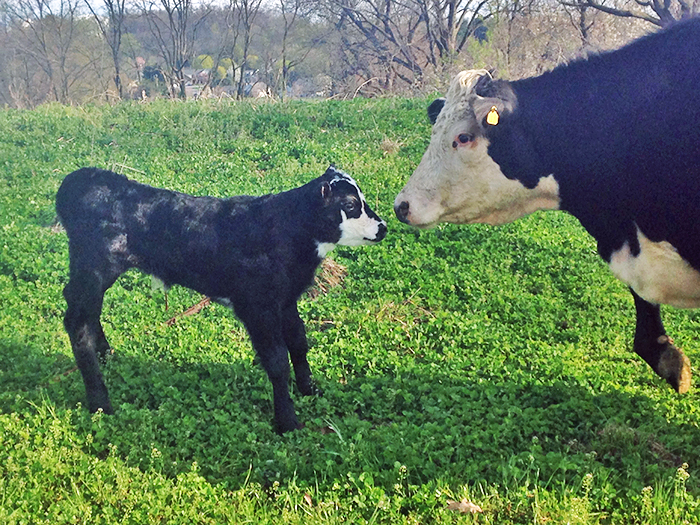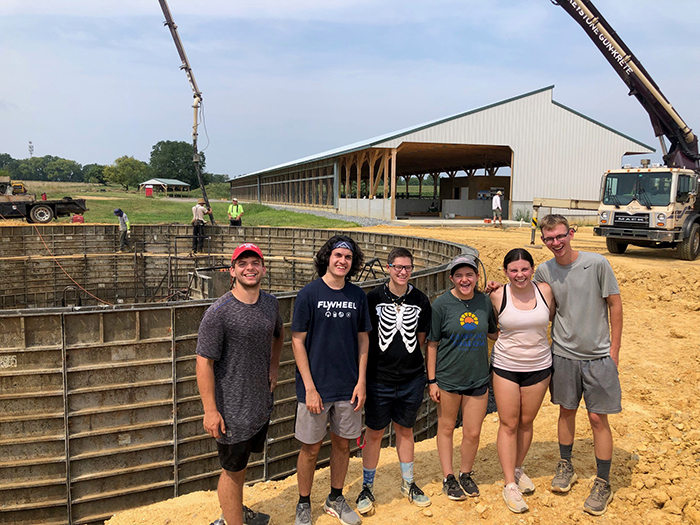Powering Up: Pioneering Biogas Project Poised for Prime Time

The new, grant-funded biodigester uses cost-efficient technology to convert cow manure and food waste into clean energy. Photo courtesy of Matt Steiman.
Waste-to-energy project positioned as national model
by MaryAlice Bitts-Jackson
Five years ago, it was only an idea. Now, a pioneering Dickinson College Farm project is in its home stretch. Here’s the latest news about the farm’s biogas venture, which will distinguish Dickinson as having the only college farm in the Northeast to be a net exporter of clean energy.
The biodigester will process manure from 150 local dairy cows and food waste from campus and outside sources to create digestate to fertilize crops and biogas to generate about 200,000-300,000 kWh per year of renewable electricity. The energy will be used to power all operations at the farm, and excess clean energy will be sold back to the Pennsylvania-based power company Met-Ed so it may be used by the farm’s neighbors.
The project started with a feasibility study in 2018, and plans were drawn up with guidance from industry experts, including food- and yard-waste pioneer Nelson Widell ’70. Since fundraising launched in earnest in 2020, the farm has secured 11 grants from state and federal agencies, totaling more than $1.3 million.
After much paperwork and permit applications, the fun part began.
"Every day brings us one day closer to our goal.” —Matt Steiman
The biodigester facility was constructed in 2023, and its combined heat and power (CHP) engine, which will convert biogas into electricity and heat, arrived this month. Pipefitting followed.
Because modern power systems work best when connected to a utility, new telephone poles and wires were recently installed, along with a transformer, connecting the farm to Met-Ed. This makes it possible for the farm to sell excess clean energy back to the utility. At the time of this writing, the CHP is hooked up and the electrical work is complete. Once the juice is flowing and tested, cows will be moved into the facility at the neighboring Triple L Dairy Farm, which stands on Dickinson-owned land. (Triple L has 150 cows; Dickinson's farm has 11.) Matt Steiman, the College Farm’s assistant director and director of energy projects, estimates that the whole operation will be up and running in two months.
Sharing progress and inspiration

Construction was not yet complete when these first-year students visited during last August's Pre-Orientation. Photo courtesy of Matt Steiman.
The farm’s new educational pavilion helps get the word out through its outdoor classroom and hands-on lab, which includes a miniature biogas demonstration model. Last year, College Farm student interns and staff hosted 12 biogas tours and presentations for school groups, teachers, local clubs, farmers and other interested citizens and professionals from the National Farm Bureau, the USDA and Cornell University. More tours and demonstrations are scheduled for the spring.
“We’ve seen a lot of excitement so far, and it’ll be even more fun when we have the system up and running,” says Steiman, noting that staff will share production and economic data with farmers and agricultural-recycling professionals as the project unfolds.
This project stands to serve as a national model for clean-energy production; available grants and new, cost-effective equipment place the project within reach of small agricultural operations. The biodigester project also shines a light on a career path in sustainability for Dickinson students, such as Johannes Ali '22, who conducted bioenergy research at the farm and is now a grad student in Penn State’s bioenergy program.
“It’s great to see that students are already benefiting from working on this project, and we’re only getting started,” Steiman says. “We can’t wait to ... get everything rolling. Every day brings us one day closer to our goal.”
TAKE THE NEXT STEPS
Published January 25, 2024